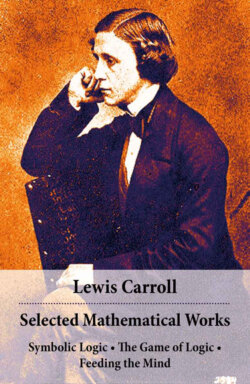Читать книгу Selected Mathematical Works: Symbolic Logic + The Game of Logic + Feeding the Mind: by Charles Lutwidge Dodgson, alias Lewis Carroll - Lewis Carroll - Страница 15
На сайте Литреса книга снята с продажи.
§ 1. Introductory.
ОглавлениеNote that the word “some” is to be regarded, henceforward, as meaning “one or more.”
The word ‘Proposition,’ as used in ordinary conversation, may be applied to any word, or phrase, which conveys any information whatever.
[Thus the words “yes” and “no” are Propositions in the ordinary sense of the word; and so are the phrases “you owe me five farthings” and “I don’t!”
Such words as “oh!” or “never!”, and such phrases as “fetch me that book!” “which book do you mean?” do not seem, at first sight, to convey any information; but they can easily be turned into equivalent forms which do so, viz. “I am surprised,” “I will never consent to it,” “I order you to fetch me that book,” “I want to know which book you mean.”]
But a ‘Proposition,’ as used in this First Part of “Symbolic Logic,” has a peculiar form, which may be called its ‘Normal form’; and if any Proposition, which we wish to use in an argument, is not in normal form, we must reduce it to such a form, before we can use it.
A ‘Proposition,’ when in normal form, asserts, as to certain two Classes, which are called its ‘Subject’ and ‘Predicate,’ either
(1) that some Members of its Subject are Members of its Predicate;
or (2) that no Members of its Subject are Members of its Predicate;
or (3) that all Members of its Subject are Members of its Predicate.
The Subject and the Predicate of a Proposition are called its ‘Terms.’
Two Propositions, which convey the same information, are said to be ‘equivalent’.
[Thus, the two Propositions, “I see John” and “John is seen by me,” are equivalent.]
